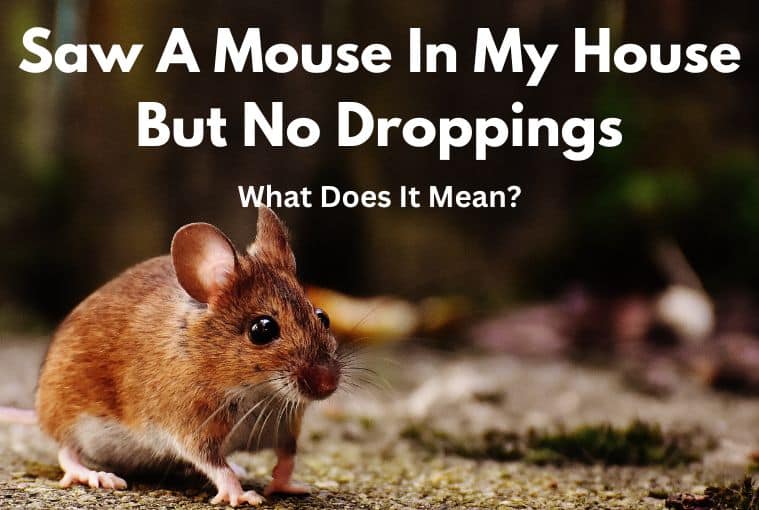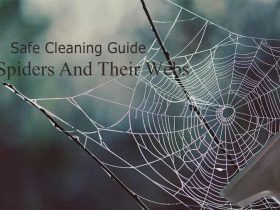Seeing a mouse in your kitchen or living room can be an unpleasant surprise to you. The discovery is followed by immediate questions like: How did it get in? Is the mouse alone, or are there more? Is my house already suffering a mice infestation? And most importantly, why haven’t I seen any mouse droppings yet?
The most reassuring answer to this question would be that if you have only spotted a mouse, then there is a possibility that your house is not yet infested. But before jumping to this conclusion, you should conduct a thorough search for mouse dropping in the kitchen, under the sink, in the cabinets or pantry. If you are living in a house that has a basement or attic, you should probably search those dark corners first. If you discover fresh mouse droppings that size up to a rice grain, then that means a mouse or possibly a horde of mice has been infesting your home.
Remember! Taking prompt action from the beginning can prevent the infestation from spreading. Do not stress yourself with all such worries. I will provide insightful information on what to do if you’ve seen a mouse in your home. Furthermore, I will also walk you through causes and preventive methods in detail.
What are some of the tell-tale signs of mice infestation?
Mice are quite sneaky by nature. There might be no foolproof sign to indicate their presence. While I know most of you will agree that droppings are the surest signs, but no droppings can be confusing. If you still have not seen any droppings it means that the infestation has still not spread. In that case, you should look for other signs that will lead you to discover the rats or mice:
- Mice have a constant urge to chew or bite things to keep their teeth from growing. Make sure you look out for gnawed wires, furniture, clothes or any other household item. Such items are a strong indicator of mice in your homes.
- Like any other animals, mice also seek protection by building nests using readily available materials like paper, fabric, and insulation. If you spot these materials lying around, that means you are closer to your investigation of discovering mice. Additionally, you should also check dark corners and hidden spaces in your home for such nests.
- Although this indicator is subtle, it is most effective during the night. Since mice are nocturnal beings, their activities/movements produce the sound of scratching or scurrying walls or ceilings. By keeping an ear open to such noises you can confirm the presence of mice in your home.
- Mice have the habit of leaving urine trails wherever they go. While these stains may not be immediately visible, you can use a UV light to reveal them as glowing spots. Tracing the trail will help you trace their paths and potential nesting areas.
- A heavy mouse infestation is bound to produce an unpleasant smell. Keep a watchful eye and nose for a musty or urine-like smell in certain areas of your home, especially in the kitchen and cabinets.
Mouse Behavior and Habits
By now, the alarm bells ringing in your mind might be asking you how mice manage to create so much trouble. Well, I shall now familiarise you with some of their habits and behavioral patterns to help you gain a better understanding of their actions.
- Mice are super active at night because they are nocturnal. This makes it harder to spot them during the day. If you’ve glimpsed a mouse during the daytime, it’s an indication that the infestation may be widespread and needs immediate attention.
- Mice are excellent climbers and jumpers. They can climb walls and jump several times their body length, enabling them access to basically every corner of your home.
- As curious creatures, mice will set out to explore any new object or area they come across. This might make them venture across open spaces like the living room of your house.
- Mice are infamous for reproducing rapidly. A pair of mice can reproduce rapidly, with a single female capable of having up to six litters in a year. This means you will have to address the issue promptly to prevent an explosion in their population within your home.
How to Get Rid of Mice
After walking you through all the potential damage and the reasons behind them, I will provide the best solutions to tackle the situation.
- The first thing you can do is identify and seal any potential entry points. Being small and flexible, mice can squeeze through small openings. Make sure to be thorough in your inspection. Pay attention to gaps around pipes, vents, and windows, and seal them tightly.
- Mouse traps seem inhuman, but are used by many when no other alternative is available. You should place mouse traps strategically in areas where you’ve noticed signs of activity. You can also place them near known entry points or along their travel routes.
- Maintaining clean surroundings is the key. Ensure to eliminate food sources by keeping your home clean and storing them in airtight containers. Mice are drawn to easily accessible food, so depriving them of this resource is the crucial step you need to take.
- While these methods are the primary aid, you should consider seeking professional help if the problem persists for a prolonged period. Don’t think twice before going for professional pest control services. Experts will help assess the extent of the infestation and employ advanced techniques to eliminate the mice from your home safely.
- As you already know, prevention is better than cure. Once the mice are gone, focus on preventing future infestations. You can do so by keeping your home well-maintained, regularly inspecting for cracks and openings, and considering using deterrents like peppermint oil or ultrasonic devices.
Conclusion
Don’t be fooled by the absence of droppings. As relieving as it seems, it’s important to remain vigilant when you spot a mouse in your home. Mice are extremely resourceful creatures and can quickly adapt to their environment, making them a challenging pest to eliminate. By understanding their habits, spotting alternative signs, and taking proactive steps, you can effectively address the issue and ensure your home remains mouse-free.
I hope you can confidently handle a mouse infestation, even when droppings aren’t immediately evident with these insights and strategies in mind.









Leave a Reply
View Comments